Intel Core i9-14900KS Review: The Swan Song of Raptor Lake With A Super Fast 6.2 GHz Turbo
by Gavin Bonshor on May 10, 2024 10:30 AM ESTCPU Benchmark Performance: Encoding
One of the interesting elements of modern processors is encoding performance. This covers two main areas: encryption/decryption for secure data transfer and video transcoding from one video format to another.
In the encrypt/decrypt scenario, how data is transferred and by what mechanism is pertinent to on-the-fly encryption of sensitive data - a process by which more modern devices are leaning towards for improving software security.
We've updated our list of encoding benchmarks for our 2024 CPU suite to include some of the most relevant and recent codecs, such as AV1, HEVC, and VP9. Not only this, but we have also included FLAC audio encoding as well as WebP2 image encoding into the mix to show not only how the latest processors perform with these codecs but also to show discrepancies in performance throughout the different segments.
We are using DDR5 memory on the Core i9-14900KS, as well as the other Intel 14th Gen Core series processors including the Core i9-14900K, the Core i7-14700K, Core i5-14600K, and Intel's 13th Gen at the relative JEDEC settings. The same methodology is also used for the AMD Ryzen 7000 series and Intel's 12th Gen (Alder Lake) processors. Below are the settings we have used for each platform:
- DDR5-5600B CL46 - Intel 14th & 13th Gen
- DDR5-5200 CL44 - Ryzen 7000
- DDR5-4800 (B) CL40 - Intel 12th Gen
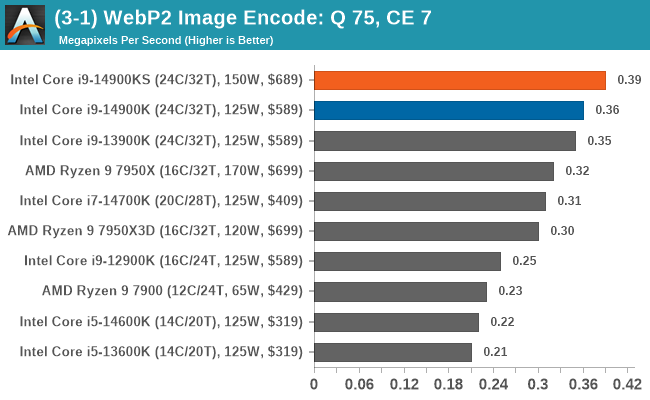
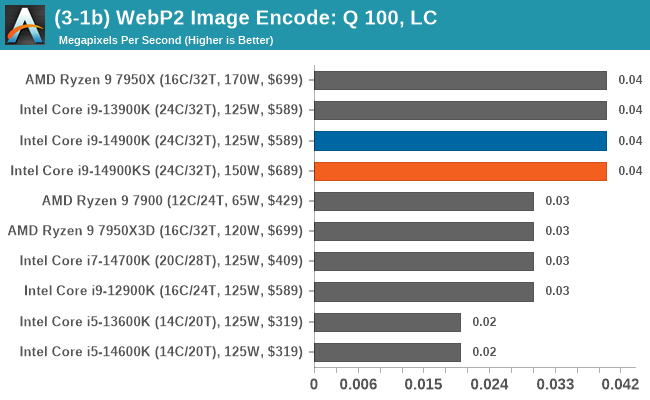
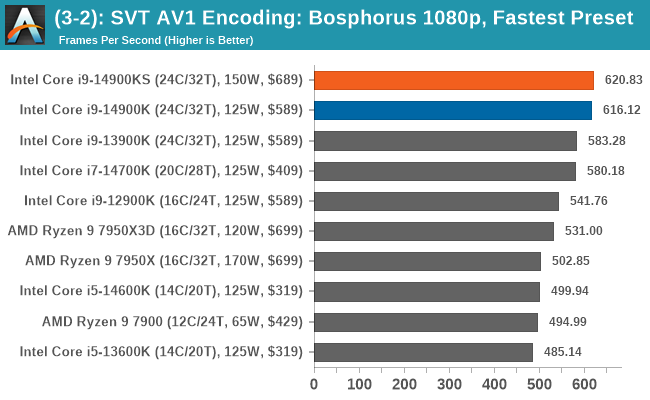
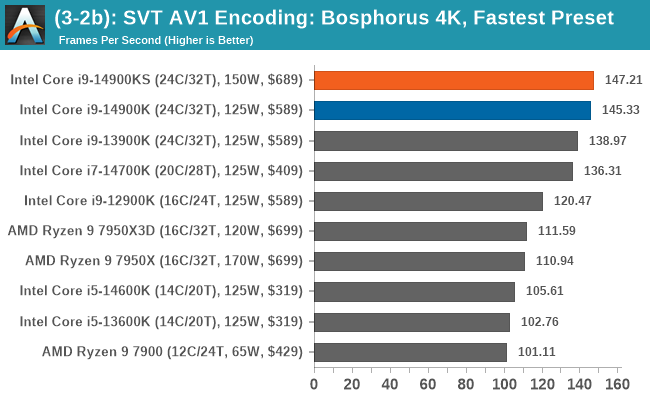
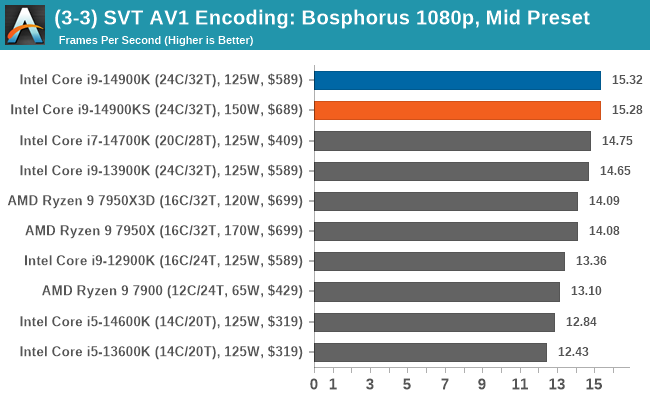
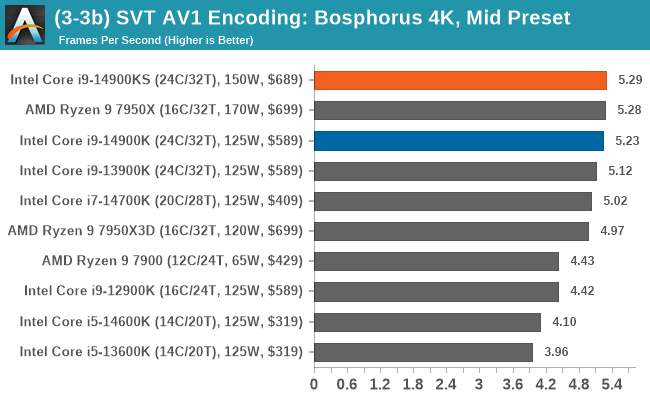
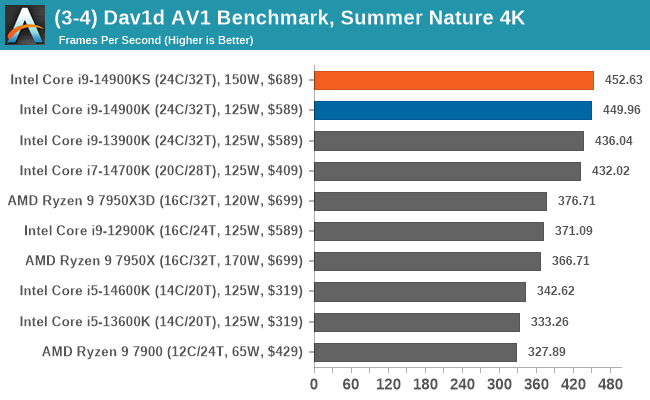
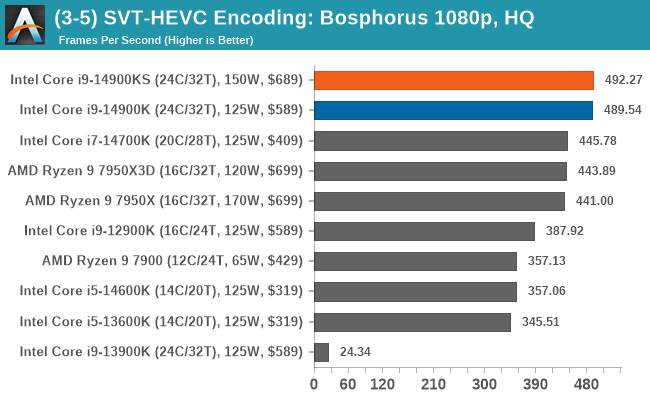
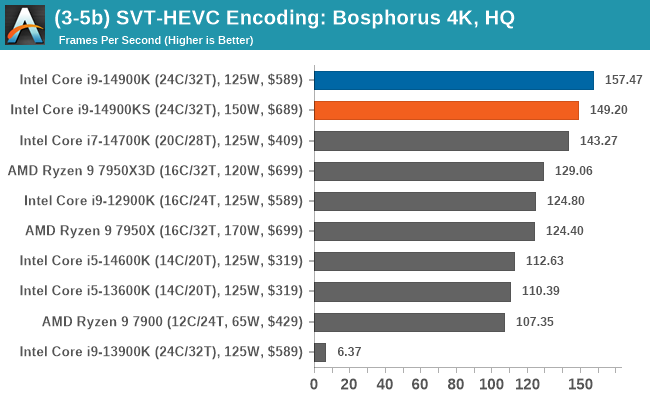
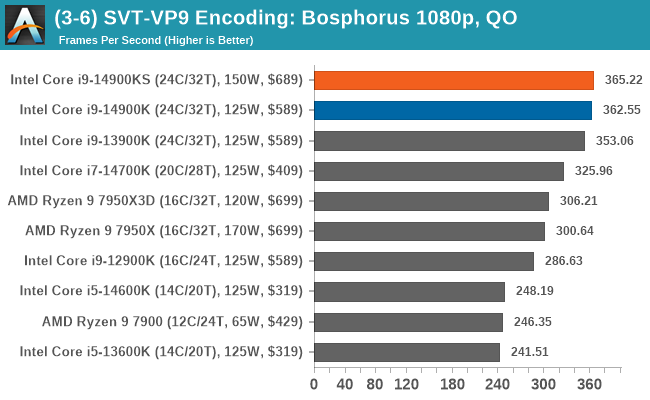
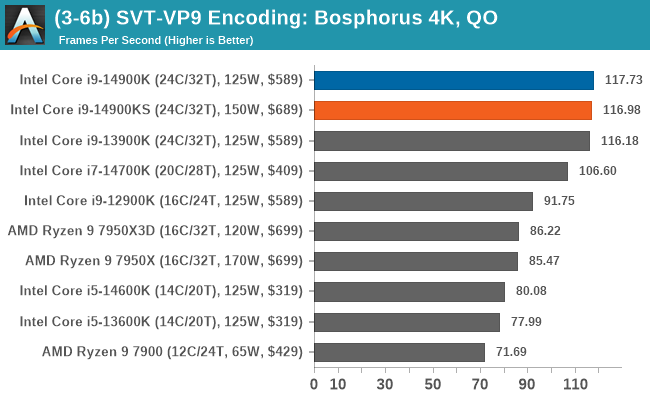
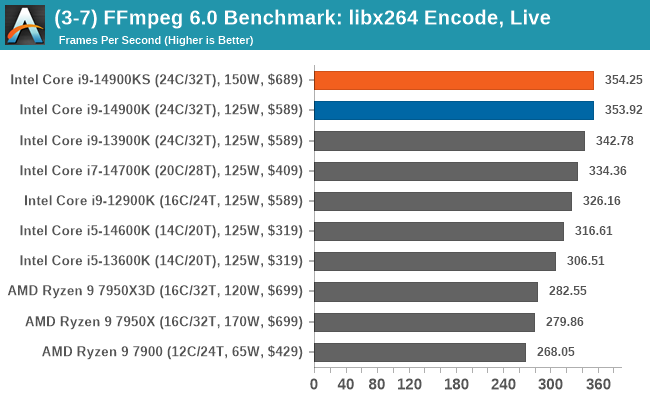
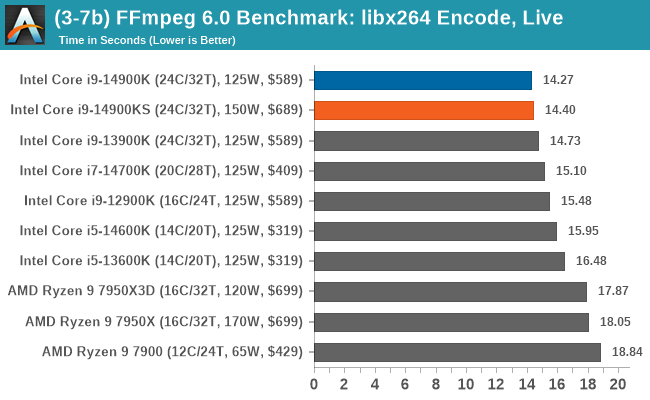
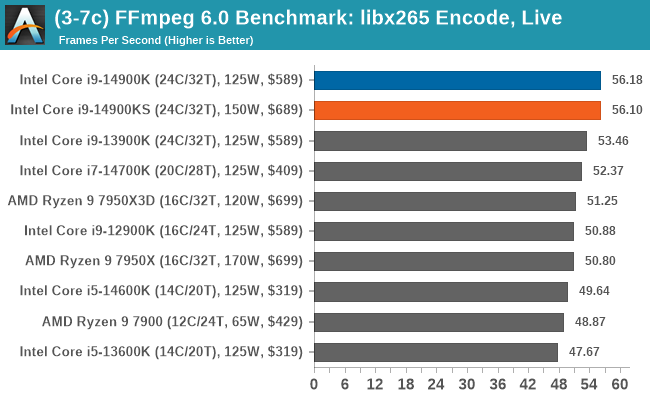
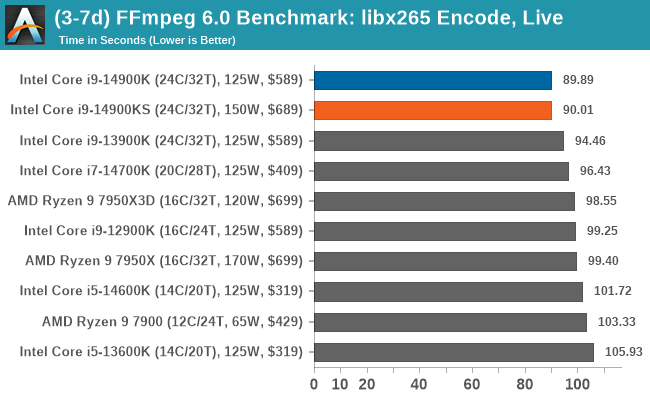
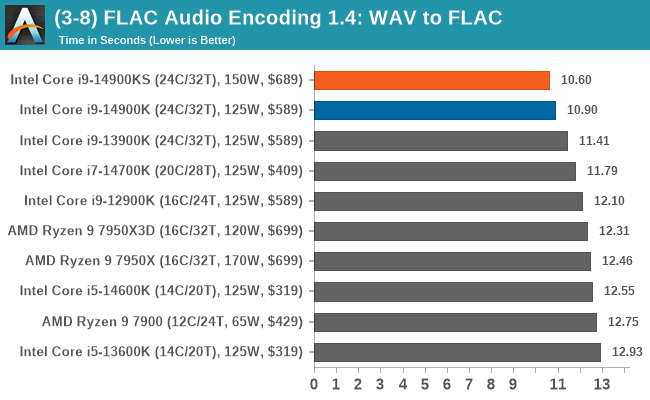
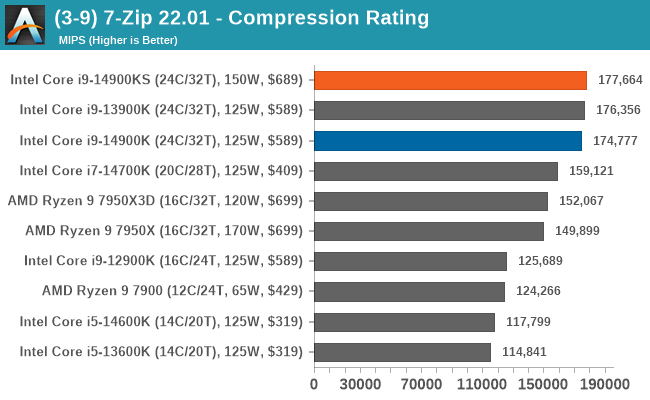
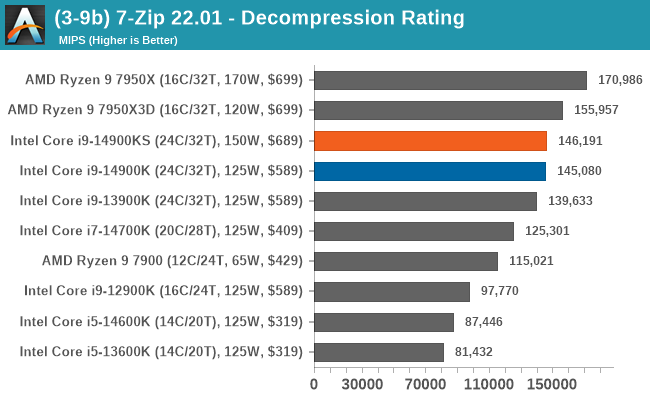
Onto encoding, the Core i9-14900KS and its higher core frequencies typically make a little difference in performance, especially compared directly to the Core i9-14900K. Again, much of the gains in performance, where there are any, are marginal at best.










54 Comments
View All Comments
Ryan Smith - Saturday, May 11, 2024 - link
We just finished reviewing it. Several things came in/required attention at once. Replylemurbutton - Friday, May 10, 2024 - link
Anandtech should focus on comparing x86 CPUs to ARM CPUs if they want to differentiate. Any media can run the benchmarks provided here. But not many or no one is doing Intel/AMD vs Apple Silicon thoroughly.M4 ST speeds are 20%+ faster than an Intel 14900KS. Reply
evanh - Saturday, May 11, 2024 - link
The problem is the same as it always has been - It's not a fair hardware comparison when the APIs (OS/libraries) are difference, compilers are different, power settings are different, and both hardware centric and software centric optimisations are different.Example: It's bad enough just comparing the same OpenGL package this way, Comparing D3D against OGL never worked. Reply
goatfajitas - Sunday, May 12, 2024 - link
and there you are again, spouting Apple nonsense. Yes, in Apple's ARM favoring benchmarks ARM CPU's do better. IT has little relevance to x86 CPU's which are far more powerful. ARM is great for mobile. NEXT! Replyevanh - Sunday, May 12, 2024 - link
Apple strongly supported Intel parts for quite a number of years. They're moving on precisely because Intel hasn't been performing for a while now. ReplyIgor_Kavinski - Saturday, May 11, 2024 - link
Hi Gavin! Can you please point to official URLs/documents that provide the JEDEC timings for Intel and Ryzen CPUs, based on which you chose your settings? Thanks! Replythestryker - Sunday, May 12, 2024 - link
I look forward to future power profile testing as the issues with RPL die seem to have finally forced Intel's hand with regards to default settings. Would also love to see some memory speed scaling tests as this hasn't really been done in depth that I've seen. Replyxray9 - Sunday, May 12, 2024 - link
High power consumption, overclocking potential seemingly depleted from the get-go due to intensified competition with AMD. This likely leads to instabilities exacerbated by additional tuning from motherboard manufacturers, which used to be a non-issue. One could also argue that the design is in need of renewal or that one must abandon overclocking in this area. Both motherboard manufacturers and customers alike. Replyedlee - Sunday, May 12, 2024 - link
This cpu is a dumpster fire waiting to happen, eventually the aio will fail, and even will a correctly sized cooler this will heat up your room pretty quick. Intel needs to go back to and learn how to correctly make a cpu that doesn't need more than a 130w cooler. This is insane, work on ipc, and ipc alone, I don't give a hoot about max clock speeds. Replydoncerdo - Sunday, May 12, 2024 - link
Seeing the results, the conclusion from the AT of old would have been simple, do not buy unless you want a binned CPU for LN2 over locking. Bit disappointing tons of data, terrible conclusion. Reply